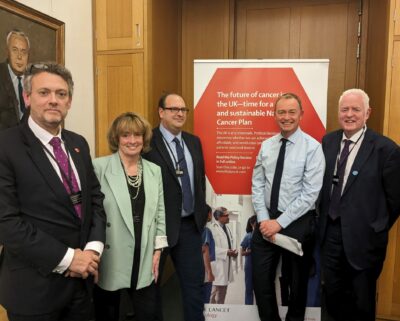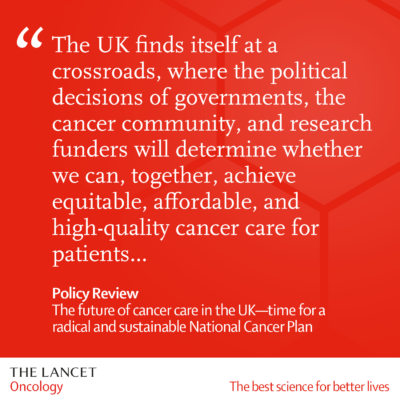 Several of the UK’s leading cancer experts have urged government to recognise the huge cost of failing to tackle the cancer crisis.
Several of the UK’s leading cancer experts have urged government to recognise the huge cost of failing to tackle the cancer crisis.
Professor Pat Price, Professor Mark Lawler, Professor Richard Sullivan and The Lancet Oncology editor-in-chief, David Collingridge, joined Tim Farron MP for the launch of their 10-point sustainable national cancer control plan on November 15, in Parliament.
Tim Farron MP, chair of the APPGRT for Radiotherapy, is a long-term campaigner for improving cancer access and emphasised that a sustainable cancer control plan is an all-party issue.
All of the headline authors of the plan spoke to the economic and human cost of failing to act, with Professor Lawler proposing that a slow or inadequate response could see cancer rates soar to two in three. He urged decision-makers to think of the cost of failing to act and invest. At present, one in two of us will have cancer in our lifetimes. By 2040, rates are expected to rise sharply, with 2,000 extra cancer patients per week in need of services.
Speaking before the event, Professor Lawler said: “Our previous research (published in Lancet Oncology) has shown conclusively that cancer policy consistency is associated with superior 5 year survival outcomes – getting rid of a dedicated cancer strategy will cost lives.

“Dismantling the National Cancer Research Institute is also a big mistake, particularly as we have just shown through the Lancet Oncology European Groundshot Commission that cancer research is a necessity for delivering 21st century cancer care, not a luxury.”
Tim Farron MP added: “You’d be staggered to see the cost of early mortality. Not having a plan is expensive.”
The event, at Portcullis House, was well-attended by ministers, cancer charities and patients.
It is hoped that the 10-point plan will help health ministers take charge of cancer in the UK, which currently sits low down on the survival league tables.
Professor Pat Price, speaking at the event, said: “Cancer is important. 1 in 2 of us will get it. It absolutely has to be a national priority. The most important thing is to get treatment on time. Otherwise thousands of people will lose their lives unnecessarily.”
Professor Sullivan urged the audience to ‘reflect on the idea of hope’ and pointed out that UK cancer care was an ‘omnishambles’ in the 80s and 90s: “We have come a long, long way and should recognise areas of excellence. But we cannot deny the areas where we are failing.”
Further coverage
The Daily Mail – Fight against cancer must undergo a ‘fundamental reset’, leading doctors warn as they unveil 10-point plan to improve care in the UK – https://www.dailymail.co.uk/health/article-12748093/Fight-against-cancer-undergo-fundamental-reset-leading-doctors-warn-unveil-10-point-plan-improve-care-UK.html
The Guardian – UK cancer care in crisis and patients will die due to lack of strategy, experts warn. Report by leading cancer experts criticises ministers for scrapping dedicated plan to tackle disease
The Independent
https://www.independent.co.uk/news/health/cervical-cancer-uk-england-symptoms-b2447091.html
Daily Express coverage of within NHS announcement
https://www.express.co.uk/life-style/health/1834909/cervical-cancer-eliminated-england-nhs
Top cancer doctors call for UK-wide improvements in care. A policy review has suggested a 10-point plan to improve current standards.
Link to one of the stories – https://www.shropshirestar.com/news/uk-news/2023/11/14/top-cancer-doctors-call-for-uk-wide-improvements-in-care/
